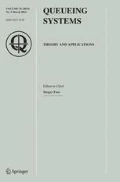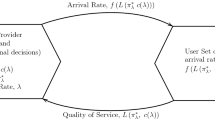Abstract
Previously established necessary and sufficient conditions for finite stationary moments in stable FIFO GI/GI/s queues exist only for the first component of the workload vector, the delay, and the final component, which behaves as the total work in the system. In this paper, we derive moment results for all the components of the stationary workload vector in stable FIFO GI/GI/s queues. As in the case of stationary delay, the moment conditions for workload components incorporate the interaction between service-time distribution, traffic intensity and the number of servers in the queue.
If we denote a generic service-time random variable by S, a generic interarrival time by T, and define the traffic intensity as ρ=ES/ET, then sufficient conditions for EW i <∞, where W i is the ith smallest component of the ordered workload vector, depend crucially on the traffic intensity relative to i—specifically, on whether i≤⌈ρ⌉ or i>⌈ρ⌉, where for any real x, ⌈x⌉ denotes the smallest integer greater than or equal to x. Explicitly, for i≤⌈ρ⌉, \(\mbox {E}W_{i}^{\alpha}<\infty\), provided that \(\mbox {E}S^{\beta_{1}(i)}<\infty\), where β 1(i)=(s−⌊ρ⌋+α)/(s−⌊ρ⌋), for α≥1. Furthermore, components with indices lower than ⌈ρ⌉ all share the same finite moment conditions. This is not true for i>⌈ρ⌉; these components have individual finite moment conditions: \(\mbox {E}W_{i}^{\alpha}<\infty\) provided that \(\mbox {E}S^{\beta_{2}(i)}<\infty\), where β 2(i)=(s−i+α)/(s−i), for α≥1. Finally, for S in a large class of service distributions, these conditions are also necessary.
Similar content being viewed by others
References
Asmussen, S.: Applied Probability and Queues. Springer, New York (2003)
Baccelli, F., Foss, S.: Moments and tails in monotone-separable stochastic networks. Ann. Appl. Probab. 14(2), 612–650 (2004)
Foss, S., Korshunov, D.: Heavy tails in multi-server queue. Queueing Syst. 52, 31–48 (2006)
Foss, S., Korshunov, D.: How big queues occur in a multi-server system with heavy tails (2009, in preparation)
Harchol-Balter, M.: The effect of heavy-tailed job size distributions on computer system design. In: Proceedings of ASA-IMS Conference on Applications of Heavy Tailed Distributions in Economics, Engineering and Statistics, Washington (1999)
Harchol-Balter, M.: Task assignment with unknown duration. J. Assoc. Comput. Mach. 49(2), 260–288 (2002)
Kiefer, J., Wolfowitz, J.: On the theory of queues with many servers. Trans. Am. Math. Soc. 78, 1–18 (1955)
Kiefer, J., Wolfowitz, J.: On the characteristics of the general queueing process with applications to random walk. Ann. Math. Statist. 27, 147–161 (1956)
Scheller-Wolf, A., Sigman, K.: Delay moments for FIFO GI/GI/c queues. Queueing Syst. 25, 77–95 (1997)
Scheller-Wolf, A.: Necessary and sufficient conditions for delay moments in FIFO multiserver queues: why s slow servers are better than one fast server for heavy-tailed systems. Oper. Res. 51, 748–758 (2003)
Scheller-Wolf, A., Vesilo, R.: Structural interpretation and derivation of necessary and sufficient conditions for delay moments in FIFO multiserver queues. Queueing Syst. 54, 221–232 (2006)
Whitt, W.: The impact of a heavy-tailed service-time distribution upon the M/GI/s waiting-time distribution. Queueing Syst. 36, 71–87 (2000)
Wolff, R.: Stochastic Modeling and the Theory of Queues. Prentice-Hall, New Jersey (1989)
Author information
Authors and Affiliations
Corresponding author
Rights and permissions
About this article
Cite this article
Scheller-Wolf, A., Vesilo, R. Sink or swim together: necessary and sufficient conditions for finite moments of workload components in FIFO multiserver queues. Queueing Syst 67, 47–61 (2011). https://doi.org/10.1007/s11134-010-9198-6
Received:
Revised:
Published:
Issue Date:
DOI: https://doi.org/10.1007/s11134-010-9198-6




